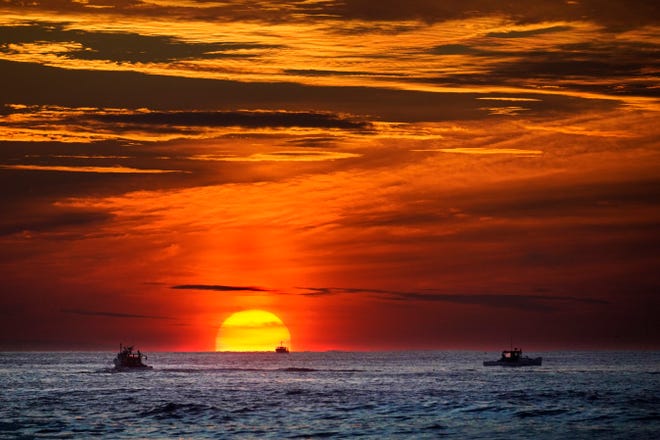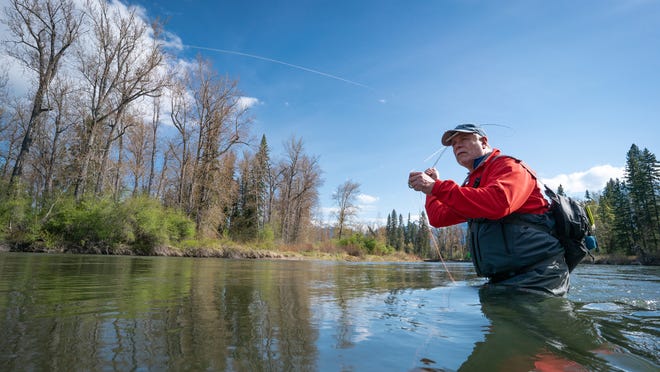- Seafood Watch added the American lobster, targeted by American and Canadian fisheries, to its “red list” of species to avoid this month.
- The conservation group cites the impact of lobster traps on endangered, North Atlantic right whales.
- In Maine, local lobstermen, the governor and more are furious over the new distinction – arguing that fishermen have worked to protect right whales for years.
YORK, Maine – Local lobstermen are furious over a recent “red list” designation by the environmental group Seafood Watch discouraging the purchase of Gulf of Maine lobster.
Seafood Watch, which collaborates with companies including Whole Foods and Cheesecake Factory to label products that harm marine life, gave the American lobster an updated red-colored “avoid” rating this month. The group cites the impact of lobster traps on North Atlantic right whales, listed as endangered both federally and internationally.
Lobstermen argue their traps are regulated in the United States to the point where they consider it unfeasible for right whales to get caught in their traps. Maine lobstermen have not had an interaction with right whales in nearly 20 years, the Maine Lobstermen’s Association said this week.
Meet ‘Lucky Blue’:1-in-2-million bright blue lobster caught by father and son in Maine
Gov. Mills: ‘This designation is flat out wrong’
With the new listing, coming out the month of Maine Lobster Week, Maine lobstermen and officials as high in power as the governor are denouncing Seafood Watch for unfairly attacking Maine’s struggling lobster industry.
“Seafood Watch is misleading consumers and businesses with this designation,” Maine Gov. Janet Mills said in a statement Tuesday. She said generations of Maine lobstermen have worked hard to protect the sustainability of the lobster fishery and have taken unprecedented steps to protect right whales.
“Efforts that the federal government and now Seafood Watch have failed to recognize,” Mills continued. “This designation is flat out wrong.”
Mills’ opponent in the coming gubernatorial election, former governor Paul LePage, also released a statement denouncing the designation, saying as governor he would push back on federal regulatory policy “aimed at destroying the livelihoods” of Maine lobstermen.
“Now more than ever our lobster industry needs a steady, proven, ally,” LePage said.
Study:Crabs, octopus and lobsters feel pain. They will be recognized as ‘sentient beings’
What’s everyone talking about? Sign up for our trending newsletter to get the latest news of the day
Seafood Watch’s ‘red list’ change; lobstermen lawsuit
Seafood Watch said they changed their designation for Gulf of Maine lobster because entanglement in fishing gear is “the leading cause of serious injury and death to North Atlantic right whales.”
Seafood Watch added that lobster pots, or traps, typically have few impacts on their environment, but that cumulative effects of large-scale fishing are “likely underestimated.” They gave the American lobster in 11 other parts of the Atlantic Ocean the same designation.
The issue of the right whale is being fought in federal court, where the Maine Lobstermen Association has sued the National Oceanic and Atmospheric Administration over recent regulations on lobstermen they say are too stringent. A judge ruled this week to allow the regulations to be put into action, rejecting the lawsuit.
“The federal district court and the National Marine Fisheries Service (NMFS) have failed Maine’s lobster industry,” said Patrice McCarron, executive director of the Maine Lobstermen Association. “But this is not the end. We won’t go down without a fight.”
He said lobster is one of the most sustainable fisheries in the world due to the effective stewardship practices handed down through generations of lobstermen. Lobstermen are required to use lines that break when in contact with a whale to avoid entanglement and mark their lines with purple to identify their state. The practices in place, McCarron said, protect both the lobster resource and the right whales.
Discovery at Red Lobster:Cheddar, an extremely rare orange lobster, almost became dinner. Then, restaurant workers stepped in.
Unreported whale injuries, deaths: NOAA
Allison Ferreira of the National Oceanic and Atmospheric Administration, which oversees the country’s fisheries, said the fact right whales have not been identified in any recent interactions with lobstermen does not mean mortalities don’t occur. She said of 1,600 entanglement scars and incidents evaluated by New England Aquarium researchers, only about 16 have been traced back to a fishing location, which is 1%.
“Therefore, it is not surprising that rope known to be from Maine lobster gear has not been retrieved from a right whale in the past decade,” Ferreira said.
However, she said large whales have become entangled in Maine fishermen’s gear since it became required to mark their gear with a state-specific color of purple in 2020. Last year, she said a humpback whale was disentangled from gear fished by a Maine fisherman in federal waters. She said two dead minke whales were also found in rope with purple marks in 2020 and 2021, and two disentangled minke whales were found in rope with purple marks.
“Over 85% of all right whales show scars caused by entanglement, and about 100 new scars are detected each year,” Ferreira said. “Most right whale mortalities are unobserved.”
Climate change and the ocean:Right whales giving birth a cause for excitement, but not enough to save endangered species
Retailers pull lobster from menus
As the legal battle continues, lobstermen say the rating by Seafood Watch is just one more threat to their industry. Thousands of businesses use Seafood Watch’s recommendations to inform buying decisions, and many have pledged to avoid any items that appear on the red list.
A spokesperson for New York meal kit retailer Blue Apron, for example, said after the release of the report that the company no longer offers lobster.
In York, Cindy Donnell, the wife and mother of four fishermen, said their family and others have been barraged by regulations and attacks on their industry that will eventually destroy it. She said she has watched the shrimp fishery close, followed by the decline of groundfishermen in Maine.
“Now they’re doing it to the lobstermen,” Donnell said. “These fishermen have gone through hell.”
Contributing: The Associated Press.



